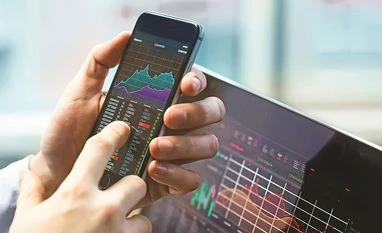GM Power freezes in 5% upper circuit, hits record high; Check details here
Brokerage firm Emkay cited GMR Power and Urban Infra's improving debt metrics and core thermal assets nearing optimal performance as reasons to go bullish on the stock
)
Shares of GMR Power and Urban Infra were up 4.98 per cent at Rs 155.95 per share on the BSE
Listen to This Article
GMR Power and Urban Infra shares clocked an all-time high of Rs 155.95 and froze in the 5 per cent upper circuit on the BSE on Tuesday. The upmove in the stock came after Emkay Global initiated coverage with a 'Buy' call on the stock, with a target of Rs 180 per share for 12 months. The brokerage firm pegged the target price at Rs 205 per share in a bull case scenario.
At around 2:11 PM, shares of GMR Power and Urban Infra were up 4.98 per cent at Rs 155.95 per share on the BSE. In comparison, the BSE Sensex traded 0.15 per cent lower at 85,052.96 around the same time.
Brokerage firm Emkay is upbeat on the company's improving debt metrics and core thermal assets (1,650 MW) nearing optimal performance on coal tie-ups, and power purchase agreements (PPAs), which will tune up to 90 per cent capacity.
Further, as per Emkay, GMR Power's 180 MW Bajoli Holi hydro-power asset has largely stabilised, while its 7.5 mn smart meter installation contract opens up a lucrative asset-light business opportunity with Bosch for vertical integration that also unleashes its execution capabilities.
Additionally, the management's clear focus on deleveraging the company's books on the back of a strong operating cash flow, supported by the conversion of Foreign Currency Convertible Bond (FCCBs) into equity and the handover of the Hyderabad-Vijayawada road project is another positive.
Also Read
"Incremental smart meter contracts, monetisation, and settlement of disputes provide sizable optional value," said Emkay in a note.
On the valuation front, Emkay values GMR Power and Urban Infra's core power generating assets at 10-12x Sep-25E Enterprise Value/ Earnings before interest, tax, depreciation, and amortisation (EV/Ebitda), smart meter project using discounted cash flow (DCF) method, and the standalone Engineering, Procurement and Construction (EPC) business at 1.0x Sep-25E book value, while optionalities could add Rs 25 per share to the bull case.
In the past one year, shares of GMR Power and Urban Infra have gained 293.7 per cent, compared to the BSE Sensex's rise of 28.7 per cent during the same period.
More From This Section
Don't miss the most important news and views of the day. Get them on our Telegram channel
First Published: Sep 24 2024 | 2:55 PM IST